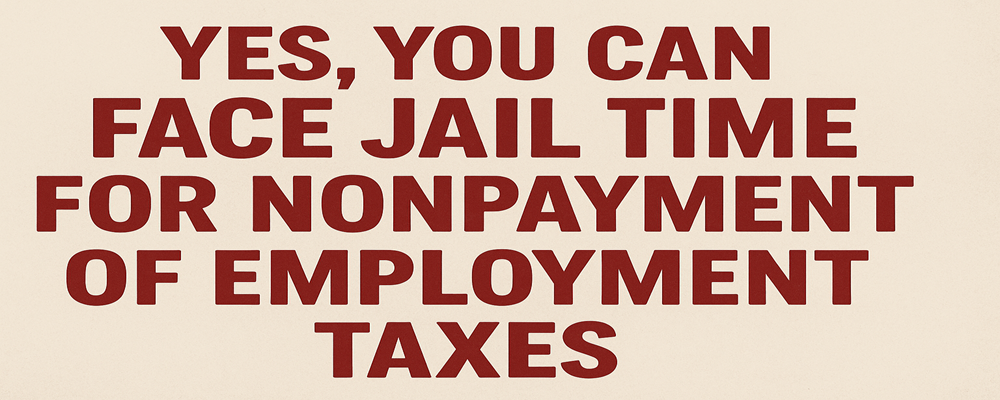Yes, You Can Face Jail Time For Nonpayment Of Employment Taxes
On August 27, 2025 the Treasury Inspector General for Tax Administration issued a report that looked at a lesser-known pandemic relief provision that allowed employers and self-employed individuals to defer Social Security tax payments during the pandemic.
That report stated that nearly 1.1 million employers opted to use the deferment which amounted to approximately $133 billion in Social Security taxes for Tax Year 2020. An estimated $131 billion (98%) was paid. However, 167,373 employers had approximately $2 billion (2%) in unpaid deferrals. According to the IRS, as of May 2025, there were approximately 10,000 employers remaining who had not paid their deferral, and the IRS has assessed an estimated $591 million in penalties and interest on 403,711 tax accounts for employers who failed to timely pay their deferred Social Security taxes. Those accounts are in Collections and subject to account enforcement.
Taxes withheld by employers account for nearly 72% of all revenue collected by the IRS, making noncompliance and cheating in this area one of the biggest problems for the nation’s tax system.
Criminal Penalties
When an employer willfully fails to pay over employment taxes, the Justice Department can pursue criminal prosecution under IRC Sec. 7202. Willful nonpayment of employment taxes is a felony under IRC Sec. 7202, punishable by a fine of up to $10,000, imprisonment up to 5 years, or both. When an employer withholds money from its employees’ paychecks and then does not pay it over to the Treasury, this act is considered embezzling money from the U.S. Treasury.
Civil Penalties
Even if the Federal government chooses not to pursue criminal prosecution, the civil penalties are still substantial. The IRS will impose a 100% trust fund recovery penalty under IRC Sec. 6672 on “responsible persons” who were required to pay over the money or who controlled the funds that should have been deposited. Many people associated with a business may be found to be a responsible person, including corporate officers, treasurers, managers, and even bookkeepers, in certain circumstances. These persons are held to be personally responsible for the taxes owed even when the business was conducted as a corporation or LLC.
Understanding Employment Taxes
Federal Income Tax – Employers generally must withhold federal income tax from employees’ wages with such withholding based on tables provided by IRS.
Social Security and Medicare Taxes – Employers generally must withhold part of social security and Medicare taxes from employees’ wages and you pay a matching amount yourself.
Additional Medicare Tax – Beginning January 1, 2013, employers are responsible for withholding the 0.9% Additional Medicare Tax on an employee’s wages and compensation that exceeds a threshold amount based on the employee’s filing status. You are required to begin withholding Additional Medicare Tax in the pay period in which it pays wages and compensation in excess of the threshold amount to an employee. There is no employer match for the Additional Medicare Tax.
Federal Unemployment (FUTA) Tax – Employers report and pay FUTA tax separately from Federal Income tax, and social security and Medicare taxes. You pay FUTA tax only from your own funds. Employees do not pay this tax or have it withheld from their pay.
Self-Employment Tax (SE tax) – is a social security and Medicare tax primarily for individuals who work for themselves. It is similar to the social security and Medicare taxes withheld from the pay of most employees.
Depositing And Reporting Employment Taxes
Depositing Employment Taxes
In general, you must deposit federal income tax withheld, and both the employer and employee social security and Medicare taxes. There are two deposit schedules, monthly and semi-weekly. Before the beginning of each calendar year, you must determine which of the two deposit schedules you are required to use. If you fail to make a timely deposit, you may be subject to a failure-to-deposit penalty of up to 15%.
Deposits for FUTA Tax (Form 940) are required for the quarter within which the tax due exceeds $500. The tax must be deposited by the end of the month following the end of the quarter.
You must use electronic funds transfer (EFTPS) to make all federal tax deposits.
Reporting Employment Taxes
Generally, employers must report wages, tips and other compensation paid to an employee by filing the required form(s) to the IRS. You must also report taxes you deposit by filing Forms 940, 941 and 944 on paper or through e-file.
What Should You Do?
If you or your business owes employment taxes, it is important to get an attorney involved immediately regardless of whether your case has yet to turn criminal. The tax attorneys of the Law Offices Of Jeffrey B. Kahn, P.C. located in Orange County (Irvine), Los Angeles and elsewhere in California know exactly what to say and how to handle issues with the IRS as well as State Tax Agencies. Our experience and expertise not only levels the playing field but also puts you in the driver’s seat as we take full control of resolving your tax problems. Also if you are involved in cannabis, check out what a cannabis tax attorney can do for you and if you are involved in crypto-currency, check out what a Bitcoin tax attorney can do for you.


 Follow
Follow Follow
Follow
